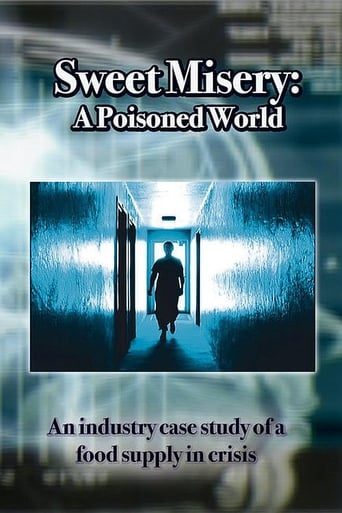athenamoriarty
This is a very watchable and important movie!At the time this movie came out, concerns about aspartame were dismissed as kooky. So this film was groundbreaking for its time, and remains an excellent exploration of an internet rumor - aspartame is damaging - that turned out to be fact.The question Cori sought to answer is: Is aspartame a dangerous substance and do doctors support that contention?The film's agenda, explicitly stated, was to first find out if these professionals were "real" doctors, and then to find out if they thought aspartame was dangerous. Dr. Roberts, Dr. Blaylock and Dr. Walton were all practicing physicians at the time of the film (Blaylock retired as a neurosurgeon but was a nutritional adviser at the time of his interview). These professionals state their positions unambiguously - nothing is taken out of context. The fact that the full length version of this movie is available free of charge on the internet suggests that the filmmakers were not in this to make a buck. And further, the filmmakers have not been sued for Sweet Misery, despite this movie putting a pretty big dent in Ajinomoto's sales of artificial sweeteners. Surely if the movie is wrong about the effects of neurotoxic aspartame there would have been legal action taken. You can't disregard the evidence in aspartame being on the market for three decades. Victims talk about slurring their words and being thought to be on alcohol while they were using aspartame.In Nov l996 John W. Olney, M.D, reported that brain tumor rates had risen for 17 years with a sudden 10% increase three years after aspartame was introduced. Olney linked aspartame's mutagenicity to the function of aspartate as an excitotoxic neurotransmitter. Dr. Olney appeared on 60 Minutes and with him Dr. Ralph Walton who declared that only NutraSweet funded studies showed safety and that 83 of 90 independent studies show it harmful. This year world famous toxicologist, George Schwartz, M.D., in writing to Monsanto said: "By ignoring the scientific studies which disagree with your position, you are doing a great disservice to consumers. Further, you may have created base for litigation against your company by denying the existing science."
John Swift
I have watched this production many times now, often with friends. Cori has done something that 60 Minutes and other major news programs did not have the courage to do. She was the very first to point out the the King was wearing no clothes. She took on big business, big politics and big food when it wasn't the thing to do. In this series of vital interviews she captures the essence of what is wrong with the Food and Drug Administration. In the process she has saved countless lives from the tragic effects of a long slow poisoning from a additive that was forced into the worlds food supply by unscrupulous politicians and a powerful industry lobby. Cori travels the United States to interview not only those who suffer from Aspartame disease but also scientists, doctors and legal scholars who could see what was coming and did what they could to stop it. This is a beautifully done and heart warming story of the courageous fight of a small band of good people who have been and continue to warn neighbors against the biggest and most cowardly affront on our country since Pearl Harbor. This is a must watch for everyone.
Tavison
Unfortunately, unlike many other conspiracy films, this one isn't even interesting. We eat and drink far more natural sources of methanol and our bodies create and dispose of formaldehyde in much larger doses than Aspartame creates. The film is just a series of a few anecdotes and specialists working outside their fields. Much the same as the ID crowd works.The movie creator at the very beginning of the film establishes a cause for her own MS and spends the film trying to prove her suspicion is correct. It's sad she has MS, but the film just seems like she is looking for somebody to blame.If your tired of the assault on science, avoid this film.
Joshua Stanton (darkdaedra)
The issues raised in this documentary are scary and enlightening. Although I was not 100% convinced that many of those interviewed in the film were experts in their field, there was more than enough convincing evidence shown in the film to damn aspartame as a sweetener. Purely from the perspective of content, the documentary was successful. However, much of the film was poorly edited. The narrative style was choppy as Ms. Brackett strongly took the reins in some sections and seemed to disappear entirely in others. In addition, given the quality of the graphics throughout the film, a better job with the occasional green-screening would have been nice. Overall, this documentary is worth the time and the content is easily interesting enough to distract from the film's faults. I highly recommend this film who includes aspartame in their diet.
